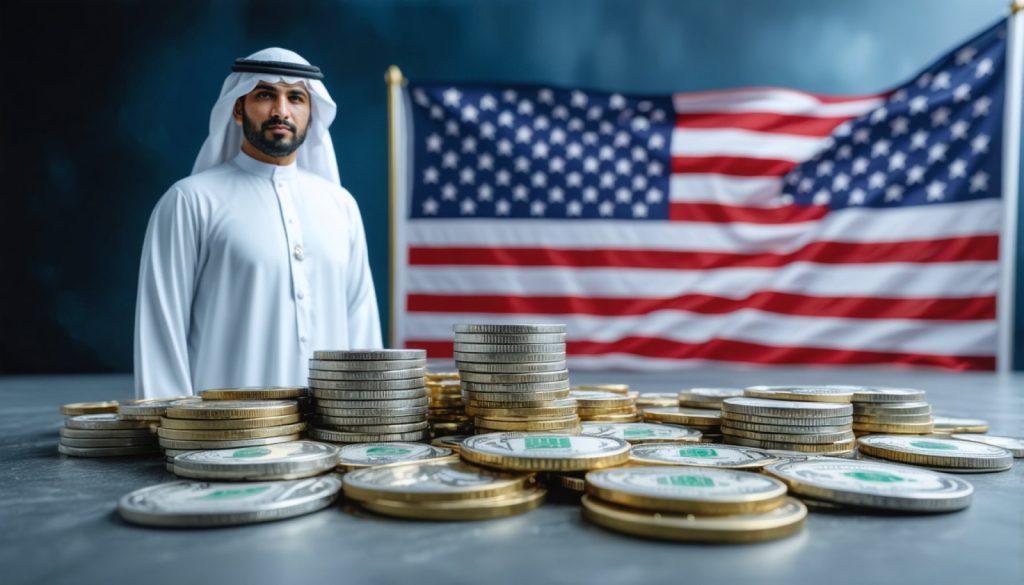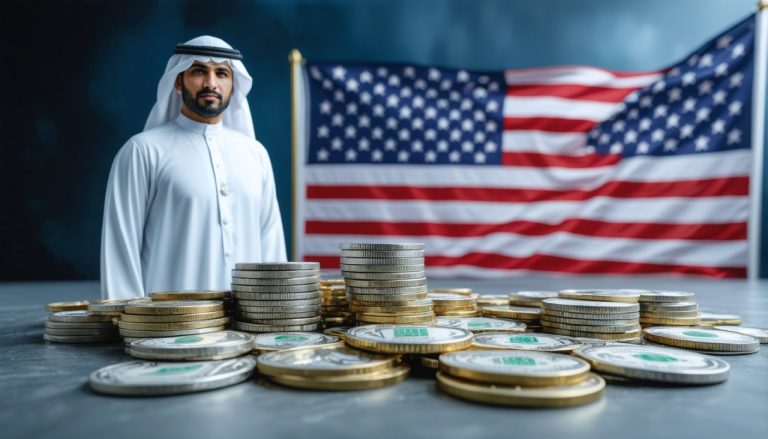
- The United Arab Emirates (UAE) is investing $1.4 trillion to become a leader in artificial intelligence and global innovation.
- The UAE seeks access to advanced U.S. semiconductors, essential for its AI ambitions, navigating strict export controls.
- G42, led by Peng Xiao, plays a pivotal role in advancing the UAE’s AI strategy, emphasizing partnerships with American tech firms.
- Strategic meetings, including discussions between President Trump and Sheikh Tahnoon bin Zayed Al Nahyan, underscore economic alliances with the U.S.
- Through alliances with companies like Microsoft, the UAE aligns with American technologies, moving away from Chinese counterparts like Huawei.
- Omar Al Olama, the UAE’s AI minister, envisions the nation as a key player in global tech innovation.
- The UAE’s comprehensive strategy highlights a mutually beneficial relationship with the U.S., aiming for global tech leadership.
A vision etched in ambition and oil, the United Arab Emirates embarks on a transformative journey to catch the AI wave, strategically positioning itself on the cutting edge of global innovation. With an audacious promise of a $1.4 trillion investment, the UAE is orchestrating an intricate dance to charm Washington and gain access to vital, advanced semiconductors currently guarded under stringent U.S. export controls.
Picture this: the sprawling desert stretches into a gleaming horizon dotted with pristine towers, a testament to the emirates’ aspirations. Underneath this facade lies a compelling narrative spun by G42, the UAE’s artificial intelligence vanguard, led by the forward-thinking Peng Xiao. The firm is making significant strides, nudging the doors open for these restricted technological jewels, essential for the UAE’s ambitious plan to evolve into an AI juggernaut.
Amidst this geopolitical chessboard, one move stands out. A meeting that saw President Donald Trump and Sheikh Tahnoon bin Zayed Al Nahyan—the consummate strategist overseeing a vast $1.5 trillion empire—set the stage for an alliance poised to shift economic tectonics. The UAE’s overtures go beyond mere transactions; it seeks an indelible mark on its tech landscape, eyeing the coveted title of an AI epicenter.
The allure of this digital El Dorado lies in the UAE’s ability to manifest tangible advancements, leveraging their exponential investments toward building robust tech infrastructures, both locally and stateside. The allure of co-investments and strategic partnerships paints a picture of harmony across oceans, with promises of generous returns.
As led by Xiao and backed by the financial muscle of MGX’s $100 billion AI venture, co-invested alongside American interests, the UAE plots a calculated course through tech-driven waters. The nation’s pivot away from Chinese firms, such as Huawei, in favor of partnerships with titans like Microsoft exemplifies a calculated alignment with American standards.
Within these strategic dialogues, Omar Al Olama, the UAE’s minister for AI and digital economy, captures the essence of the moment. His vision frames the UAE as a formidable partner, a nation transcending regional boundaries to etch its name on the tapestry of technological innovation.
While AI ambitions and trillion-dollar promises amp up this grand narrative, the underlying theme remains unequivocal—a relationship envisaged as mutually beneficial, heralded by the UAE’s determination not only to tap into American tech prowess but to ensure an evolution echoing across sectors and continents.
The stakes are high, and the story is still unfolding. Yet one thing is indisputable: the UAE, with its eye on the future and roots firmly in innovation, is setting the pace for a new digital frontier, redefining what it means to be a key player in the global technology arena.
How the UAE is Transforming into a Global AI Powerhouse
The United Arab Emirates is not just dipping its toes into the world of artificial intelligence; it’s diving in headfirst with a strategic and bold vision. With a staggering $1.4 trillion investment, the UAE is aiming to become a central player in the AI industry. The journey is as intricate as it is ambitious, involving strategic partnerships, geopolitical maneuvering, and a focus on building cutting-edge tech infrastructure.
Unpacking the UAE’s AI Ambitions
The UAE’s AI plan is spearheaded by G42, a leading artificial intelligence company led by Peng Xiao. G42 is driving the UAE’s efforts to secure access to advanced semiconductors, essential for cutting-edge AI development. This push sees the UAE engaging in diplomatic exchanges with the U.S. to navigate export controls and unlock these critical resources.
Key Milestones and Alliances
One of the most notable political maneuvers in this landscape was the meeting between President Donald Trump and Sheikh Tahnoon bin Zayed Al Nahyan. This meeting laid the groundwork for a potential alliance, seeking to establish the UAE as a technological epicenter. With partnerships shifting away from Chinese companies like Huawei to American firms like Microsoft, the UAE demonstrates its commitment to aligning with international tech standards.
Real-World Use Cases and Industry Trends
1. Development of AI in Healthcare: The UAE is investing in AI applications to revolutionize healthcare, enhancing diagnostics, patient care, and even robotic surgeries.
2. Smart Cities Initiatives: The development of AI-driven smart cities is another focus, promising improved urban planning, smart transportation systems, and energy-efficient solutions.
3. Security and Governance: AI is being utilized to boost cybersecurity and enhance government services, making operations more efficient and secure.
Market Forecasts and Industry Insights
According to recent studies, the global AI market is projected to reach over $500 billion by 2026. The UAE’s entry into this market positions it uniquely to benefit from this exponential growth, given its extensive financial resources and strategic geografical location as a link between Asia, Africa, and Europe.
Challenges and Controversies
While the UAE’s AI ambitions are clear, challenges persist. The intense competition for talent, ethical concerns related to AI, and the geopolitical complexities of tech partnerships are all hurdles the UAE must navigate. Additionally, the drive to transition away from Chinese partnerships has its own set of risks and diplomatic intricacies.
Actionable Recommendations
1. Focused Investment in Education and Training: To support its AI ambitions, the UAE should continue to invest in STEM education to develop a domestic workforce skilled in AI and technology.
2. Ethical AI Frameworks: Establishing clear guidelines and frameworks for the ethical use of AI can position the UAE as a leader in responsible AI deployment.
3. Leverage AI for Sustainability: Integrating AI into environmental and sustainability efforts will not only enhance efficiency but also strengthen the UAE’s global environmental credentials.
The UAE’s journey into AI is a testament to its broader vision of economic diversification and technological leadership. As the story unfolds, the nation continues to be a beacon of innovation, with its efforts ripe for international partnerships and investment.
For more in-depth insights on technology trends, visit G42.



